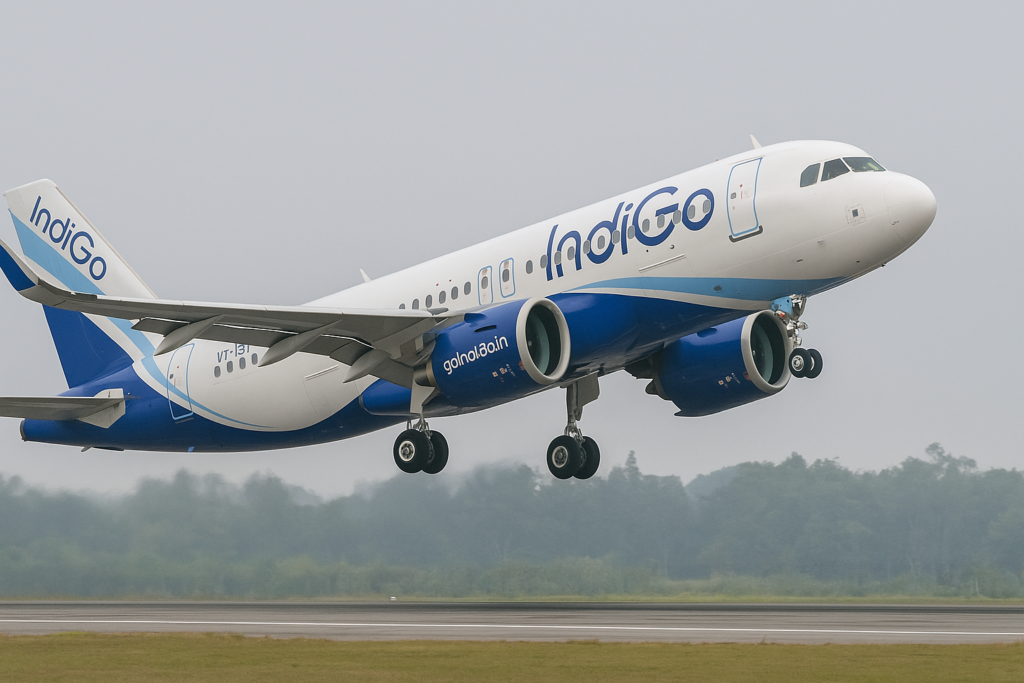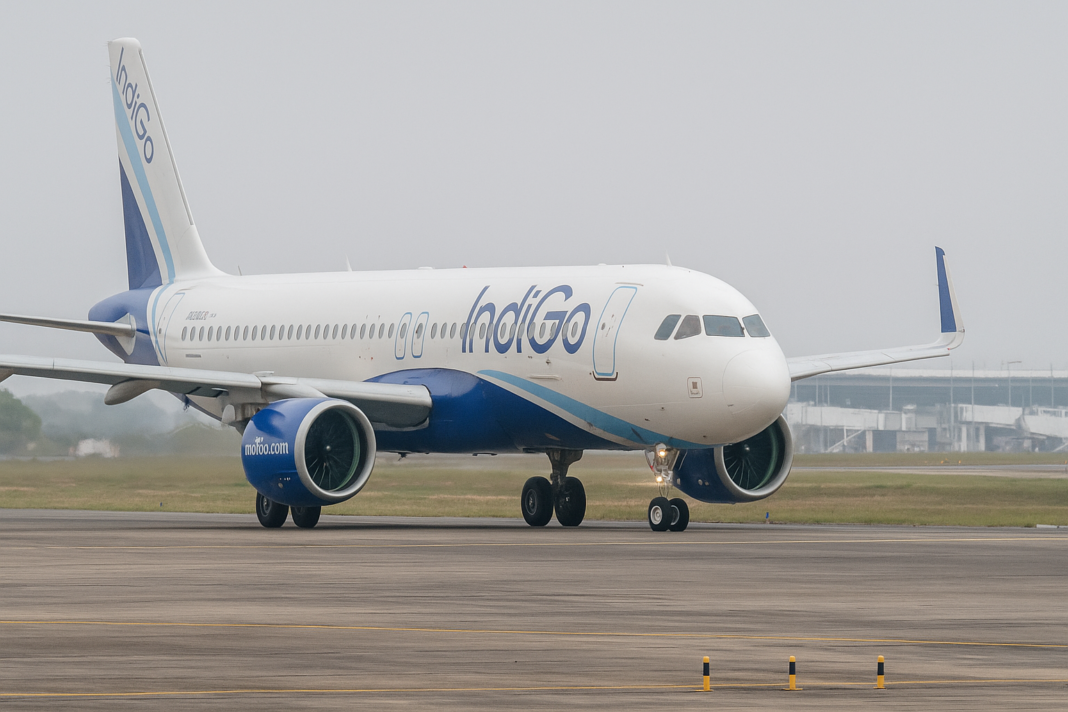
Passengers on a routine domestic flight from Chandigarh to Lucknow on IndiGo Airlines faced a tense moment recently when the aircraft was suddenly brought to a halt just before takeoff. The pilot, showing sharp awareness and commitment to safety, identified a technical fault during taxiing and immediately called off the flight. What could have turned into a dangerous mid-air situation was thankfully avoided due to the pilot’s quick decision-making.
This incident highlights how critical pre-takeoff checks and pilot instincts are in ensuring the safety of hundreds of lives every single day.
Flight Cancelled Just Before Takeoff
The incident took place on an IndiGo flight operating between Chandigarh and Lucknow. The passengers had already boarded the aircraft, and all regular pre-takeoff protocols were underway. The aircraft was taxiing towards the runway when the pilot noticed an unexpected technical warning signal on the control panel. Instead of proceeding with the takeoff, the pilot chose to pause, evaluate the situation, and eventually return the plane to the terminal.
After a brief investigation by the airline’s engineering team, it was determined that a mechanical fault had occurred. As a precaution, IndiGo decided to cancel the flight entirely, prioritizing passenger safety over schedule commitments.
177 Passengers Were Onboard
According to reports, the flight had approximately 177 passengers on board, including families, business travelers, and students. All were safely deboarded and transported back to the airport lounge. While some were frustrated by the sudden change, many expressed relief and gratitude once the cause behind the cancellation was explained.
A passenger who was on the flight said, “At first, we thought it was just another delay. But then they told us that there was a technical issue, and the flight had been called off for our safety. I would rather reach late than never.”
Pilot’s Presence of Mind Prevents Possible Danger
The spotlight in this situation is rightfully on the pilot’s quick thinking and awareness. Detecting a technical issue during the taxi phase is not always easy, and ignoring small signals can lead to major consequences once airborne. By halting the flight and requesting a thorough technical inspection, the pilot potentially saved the aircraft from mid-air complications.
A senior aviation expert noted, “The pilot made the right call at the right time. Every aircraft has a system of pre-takeoff checks, but it is the alertness and training of the pilot that makes all the difference in such moments. This is why human decision-making still plays a vital role in aviation.”
What Was the Technical Issue?
While IndiGo has not revealed detailed specifics of the fault for security and operational reasons, internal sources suggest that the issue was related to a hydraulic or navigation control system, which could have affected critical flight operations. These kinds of faults, if not addressed before takeoff, can cause serious issues while flying, including difficulty in maneuvering or landing.
In commercial aviation, such problems are flagged as “No-Go” conditions, which means the aircraft is not allowed to fly until the issue is resolved. In this case, the pilot detected the problem early enough and followed all standard safety protocols, ensuring no one was at risk.
IndiGo Issues Statement
IndiGo released a public statement shortly after the incident, assuring all passengers that safety remains their top priority. The airline confirmed that the Chandigarh-Lucknow flight was cancelled due to a technical issue and that alternative arrangements were being made for the passengers affected.
The official statement read:
“Our pilot detected a potential technical issue during taxiing and decided to return to the bay as a safety precaution. The aircraft was grounded for detailed inspection. We regret the inconvenience caused to our passengers and are working to re-accommodate them on the next available flights.”
This level of transparency was appreciated by many flyers, especially in an era where customer service and safety communication are under close public scrutiny.
Passengers React with Mixed Emotions
The reaction among passengers was mixed — some were understandably upset about their travel plans being disrupted, while others were relieved that safety was prioritized. Several travelers took to social media to share their experience, using words like “Thankful,” “Pilot saved us,” and “Better safe than sorry.”
One Twitter user posted, “Was supposed to fly to Lucknow today but our IndiGo flight from Chandigarh was cancelled right before takeoff due to technical issues. Scary but thankful for a vigilant pilot!”
Many passengers also praised the airline staff for keeping them informed during the delay, offering refreshments, and assisting in alternate bookings.
Aviation Experts Applaud the Decision
Veterans from the aviation industry and former pilots have praised the IndiGo pilot for making a swift and safety-first decision. According to them, it takes courage and professionalism to cancel a flight last-minute when operations are under tight schedules.
An ex-commander with 20 years of flying experience remarked, “It’s better to be grounded wishing you were in the air than being in the air wishing you were on the ground. This pilot deserves recognition for putting safety over timelines.”
The incident serves as a case study on how critical early warning signs should be treated with complete seriousness in commercial aviation.
IndiGo’s Growing Focus on Safety
As one of India’s largest domestic airlines, IndiGo has a strong reputation for punctuality, affordability, and an expanding route network. Incidents like these — while disruptive — highlight the airline’s commitment to safety. It is a reminder to both passengers and the aviation industry that no matter how routine a flight may seem, safety protocols cannot be compromised.
IndiGo continues to invest in crew training, aircraft maintenance, and real-time monitoring systems to avoid such occurrences. Their response in this case — from the pilot’s decision to the ground team’s quick technical checks — was swift, professional, and aligned with international aviation standards.
The Importance of Pilot Training and Technology
This incident once again proves how essential ongoing pilot training is in commercial aviation. While aircraft are equipped with advanced monitoring systems, it is the pilot’s knowledge and ability to interpret those warnings that truly matter. Many airlines, including IndiGo, conduct regular simulations, emergency response drills, and continuous education programs to sharpen pilot instincts.
Simultaneously, modern planes come fitted with flight management systems that detect anomalies and warn the cockpit crew. However, technology is only as good as the person operating it. This is why the role of pilots remains irreplaceable, even in the era of automation.
While the IndiGo Chandigarh-Lucknow flight did not take off, it managed to safely land in the hearts of many as a symbol of professionalism and caution. The airline’s crew, the technical team, and most importantly, the pilot — all demonstrated what true commitment to passenger safety looks like.
This event is a reminder to travelers everywhere that even when plans change or flights get cancelled, it is often in service of a much greater cause — your life and the lives of everyone on board.
The airline is currently working on refund and rescheduling options for the affected passengers, while the aircraft remains grounded until further technical evaluation is completed.































